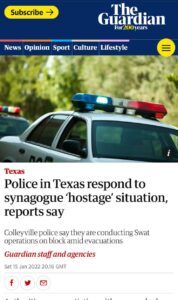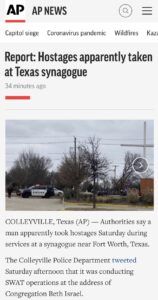Just before 11:00 on Saturday morning, a gunman entered the Congregation Beth Israel synagogue in Colleyville, Texas, during a Sabbath service led by Rabbi Charlie Cytron-Walker that was attended by three worshipers, all of whom survived unharmed.
Over the course of the 10-hour hostage situation, local and federal law enforcement negotiated with a still-unidentified attacker before eventually storming the building, resulting in his death.
Audio of the first few hours of the ordeal was captured on the synagogue’s Facebook live stream, which had been set up to allow congregants to participate in services remotely because of the coronavirus pandemic.
The gunman’s expletive-laden rants were recorded over the video stream, including his warning that he would kill people unless authorities released his “sister” — later confirmed by the FBI to be a reference to Aafia Siddiqui, a Pakistani neuroscientist serving an 86-year prison sentence after having been convicted of attempting to kill American military personnel in Afghanistan.
Yet, as events were unfolding and pictures emerged of a SWAT team outside the synagogue alongside men in military fatigues, this was how the BBC and The Guardian reported on developments:
Texas police respond to synagogue ‘hostage’ situation https://t.co/0m3peAEYWx
— BBC News (World) (@BBCWorld) January 15, 2022

For its part, the Associated Press headlined its story about the attack, ‘Report: Hostages apparently taken at Texas synagogue.’ Inserting the qualifier “apparently” is telling given that the very first line of the piece notes that authorities confirmed the nature of the attack.

The FBI also downplayed any potential connection to antisemitism, with an agent widely quoted by media outlets claiming the standoff was not related to the Jewish community and that the attacker was “singularly focused” on freeing Siddiqui. One is seemingly meant to wonder why the gunman targeted a synagogue and held Jews hostage while calling for the release of a jihadist who, among other things, blamed Israel — that is, the Jewish state, for her imprisonment.
Texas synagogue hostage stand-off not related to Jewish community – FBI https://t.co/gJL9OT4flz
— BBC News (World) (@BBCWorld) January 16, 2022
Dubbed ‘Lady Al Qaeda,’ Aafia Siddiqui was arrested by American forces in July 2008 in Afghanistan. At the time, she was, according to US officials, carrying documents related to the manufacture of “dirty bombs,” as well as notes about prominent New York City landmarks, including the Empire State Building and Brooklyn Bridge.
During her interrogation, Siddiqui managed to snatch an M-4 rifle and shot at, and missed, the FBI agent and army officer who were present — the actions that specifically led to her incarceration.
While on trial in 2010 in Manhattan, New York, she infamously told the presiding judge that she did not want any Jewish people in the jury “if they have a Zionist or Israeli background,” adding that she felt “everyone here is [Israeli], subject to genetic testing.” Shortly after her conviction, she declared: “This is a verdict coming from Israel and not from America. That’s where the anger belongs.”
Meanwhile, an hour after the first call to emergency services came in from within the Texas synagogue, the official account of the Council on American Islamic Relations (CAIR) tweeted its condemnation of this “latest antisemitic attack on Jewish Americans” that constitutes “an act of pure evil.”
A follow-up tweet offered prayers that law enforcement would quickly free the hostages, as well as assistance to local Jewish community leaders.
Yet, this apparent expression of solidarity rings somewhat hollow when the connection between CAIR and the jihadi who inspired the attack, Aafia Siddiqui, is laid bare.
For CAIR has paid special attention to Siddiqui’s case, which the group’s Dallas-Fort Worth chapter even described as “one of the greatest examples of injustice in US history.”
A search of CAIR’s website for Siddiqui’s name brings up multiple results, such as a press release titled, ‘DC: Coalition to Hold News Conference to Call for the Release of Pakistani National Dr. Aafia Siddiqui from Texas Prison.’ It proceeds to claim that Siddiqui was wrongly convicted, while labeling her a “victim of the war on terror.”
One article posted to the CAIR website highlights a previous Facebook live event about the campaign to free her that featured speakers such as Linda Sarsour and Siddiqui’s lawyer, Marwa Elbially.
Nevertheless, Reuters, for example, cited CAIR’s tweets about Saturday’s hostage-taking without even so much as a passing reference to the Muslim advocacy group’s involvement in efforts to exonerate Siddiqui.
Not only is this a colossal journalistic failure by Reuters to give its readers the full facts, but it also shields groups such as CAIR from criticism over questionable policies or the spreading of disinformation that may have contributed directly to the antisemitic violence in Texas this weekend.
After all, CAIR has claimed that Siddiqui was “kidnapped, ripped apart from her children, shot at [and] renditioned to the US.”
More recently, HonestReporting last month called out the group’s San Francisco Executive Director, Zahra Billoo, who was filmed at the 14th Annual Convention for Palestine in the US blaming “Zionists” for Islamophobia and police violence in the United States, and urging supporters to “pay attention to the Zionist synagogues.”
Overall, the attack on the Congregation Beth Israel synagogue did not occur in a vacuum, having followed deadly shooting incidents at synagogues in Pittsburgh, Pennsylvania and Poway, California in 2018 and 2019, respectively.
Rather, it comes against a backdrop of rising antisemitism — at a time when the vast majority of religiously-motivated hate crimes in the US target Jews.
Liked this article? Follow HonestReporting on Twitter, Facebook, Instagram and TikTok to see even more posts and videos debunking news bias and smears, as well as other content explaining what’s really going on in Israel and the region.
Photo by ANDY JACOBSOHN/AFP via Getty Images



